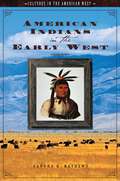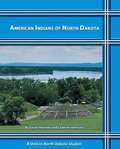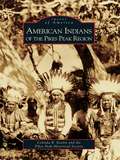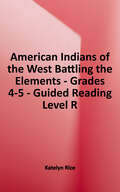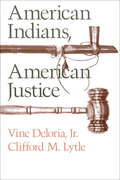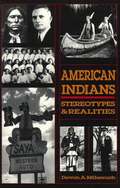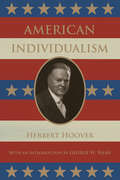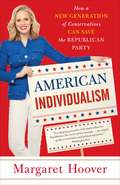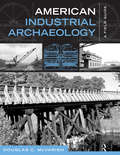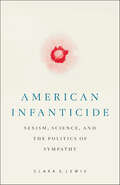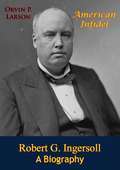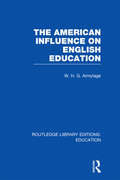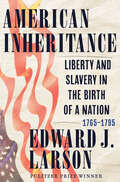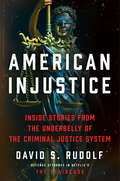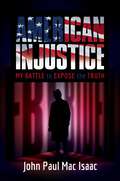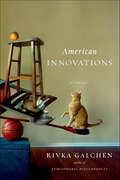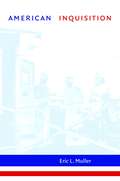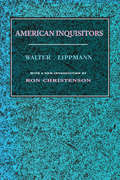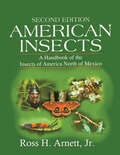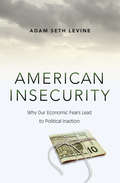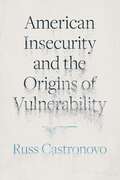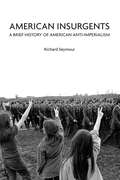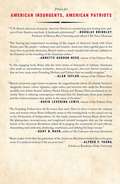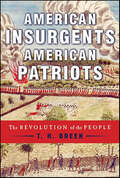- Table View
- List View
American Indians in the Early West (Cultures in the American West)
by Sandra K. MathewsMathews (history, U. of New Mexico) offers an alternative view to histories that concentrate on the violent and often tragic confrontations between native Americans and Anglo-Americans in the 19th century. Instead, she concentrates on the clashes between the Indian nations and colonizers that began almost 300 years before the United States was born. Topics include the origins, migrations and geographical location of the earlier native Americans, the history of the Spanish in the southwest, the history of the French from the Saint Lawrence and Great Lakes to the Rocky Mountains and Russian involvement from the Aleutian Chain to Northern California. The book also addresses major issues in the study of American Indian history. Annotation ©2008 Book News, Inc., Portland, OR (booknews.com)
American Indians of North Dakota (North Dakota Studies)
by Gwyn S. Herman Laverne A. JohnsonThis book is filled with interesting history, impressive facts, and inspiring profiles. Through reading and engaging in the variety of activities that accompany this text, you will find yourself on a dynamic and educational journey of discovery.
American Indians of the Pikes Peak Region
by Pikes Peak Historical Society Celinda R. KaelinThousands of years before Zebulon Pike's name became attached to this famous mountain, Pikes Peak was home to indigenous people. These First Nations left no written record of their sojourn here, but what they did leave were stone circles, carefully crafted arrowheads and stone tools, enigmatic petroglyphs, and culturally scarred trees. In the 1500s, Spanish explorers documented their locations, language, and numbers. In the 1800s, mountain men and official explorers such as Pike, Fremont, and Long also wrote about these First Nations. Comanche, Apache, Arapaho, Cheyenne, Kiowa, and Lakota made incursions into the region. These nations contested Ute land possession, harvested the abundant wildlife, and paid homage to the powerful spirits at Garden of the Gods and Manitou Springs. Today Ute Indians return to Garden of the Gods and to Pikes Peak each year to perform their sacred Sundance Ceremony.
American Indians of the West: Battling the Elements (Social Studies: Informational Text Ser.)
by Katelyn RiceThe Primary Source Readers series will ignite students' interest in history through the use of intriguing primary sources. This nonfiction reader features purposefully leveled text to increase comprehension for different learner types. Students will learn about American Indians of the West including tribes of the Pacific Northwest, Southwest, Great Basin, and Plateau. Text features include captions, a glossary, and an index to help build academic vocabulary and increase reading comprehension and literacy. This book prepares students for college and career readiness and aligns with state standards including NCSS/C3, McREL, and WIDA/TESOL.
American Indians, American Justice
by Clifford M. Lytle Deloria VineThis comprehensive overview of federal Indian law explores the context and complexities of modern Native American politics and legal rights.Both accessible and authoritative, American Indians, American Justice is an essential sourcebook for all concerned with the plight of the contemporary Indian. Beginning with an examination of the historical relationship of Indians and the courts, the authors describe how tribal courts developed and operate today, and how they relate to federal and state governments. They also define such key legal concepts as tribal sovereignty and Indian Country. By comparing and contrasting the workings of Indian and non-Indian legal institutions, the authors illustrate how Indian tribes have adapted their customs, values, and institutions to the demands of the modern world. They examine how attorneys and Indian advocates defend Indian rights; identify the typical challenges Indians face in the criminal and civil legal arenas; and explore the public policy and legal rights of Indians as regards citizenship, voting rights, religious freedom, and basic governmental services.
American Indians, American Justice
by Vine Deloria Jr. Clifford M. LytleBaffled by the stereotypes presented by Hollywood and much historical fiction, many other Americans find the contemporary American Indian an enigma. Compounding their confusion is the highly publicized struggle of the contemporary Indian for self-determination, lost land, cultural preservation, and fundamental human rights-a struggle dramatized both by public acts of protest and by precedent-setting legal actions. More and more, the battles of American Indians are fought-and won-in the political arena and the courts. American Indians, American Justice explores the complexities of the present Indian situation, particularly with regard to legal and political rights. It is the first book to present an overview of federal Indian law in language readably accessible to the layperson. Remarkably comprehensive, it is destined to become a standard sourcebook for all concerned with the plight of the contemporary Indian. Beginning with an examination of the historical relationship of Indians and the courts, the authors describe how tribal courts developed and operate today, and how they relate to federal and state governments. They define such key legal concepts as tribal sovereignty and Indian Country. By comparing and contrasting the workings of Indian and non-Indian legal institutions, the authors illustrate how Indian tribes have adapted their customs, values, and institutions to the demands of the modern world. Describing the activities of attorneys and Indian advocates in asserting and defending Indian rights, they identify the difficulties typically faced by Indians in the criminal and civil legal arenas and explore the public policy and legal rights of Indians as regards citizenship, voting rights, religious freedom, and basic governmental services.
American Indians: Stereotypes and Realities
by Devon A. MihesuahAmerican Indians are portrayed in many ways, but often the portraits reflect more myth than reality. "This book is not intended to chronicle the history of any tribe or to analyze its culture, nor to detail intricacies of American Indian tribal politics, law, or economics. It is not intended to glorify Indians nor to criticize those people who believe the myths. Its purpose is to stimulate dialogue and to correct some of the most prevalent misconceptions about Indians. There are more, no doubt. But it is my hope that this bookwill spur teachers to fight for better textbooks-books that include a complete history of this country -and to push for multicultural curriculums. It is important for all of us to recognize and to combat stereotypes. All peoples deserve to have their histories and cultures properly placed in the scheme of things. Anything less does us all a disservice." Mihesuah includes a generous number of recommended readings.
American Individualism
by George H. Nash Herbert HooverIn late 1921, then secretary of commerce Herbert Hoover decided to distill from his experiences a coherent understanding of the American experiment he cherished. The result was the 1922 book American Individualism. In it, Hoover expounded and vigorously defended what has come to be called American exceptionalism: the set of beliefs and values that still makes America unique. He argued that America can make steady, sure progress if we preserve our individualism, preserve and stimulate the initiative of our people, insist on and maintain the safeguards to equality of opportunity, and honor service as a part of our national character. American Individualism asserts that equal opportunity for individuals to develop their abilities is "the sole source of progress" and the fundamental impulse behind American civilization for three—now four—centuries. More than ninety years have passed since this book was first published; it is clear, in retrospect, that the volume was partly motivated by the political controversies of the time. But American Individualism is not simply a product of a dim and receding past. To a considerable degree the ideological battles of Hoover's era are the battles of our own, and the interpretations we make of our past—particularly the years between 1921 and 1933—will mold our perspective on the crises of the present.
American Individualism: How a New Generation of Conservatives Can Save the Republican Party
by Margaret HooverMargaret Hoover has been a lifelong member of the Republican Party. She grew up a self-described "ditto head." She worked in the White House for President George W. Bush. Today she is a political commentator for Fox News, where, as one of Bill O'Reilly's Culture Warriors, she regularly champions the conservative cause. She also happens to be the great-granddaughter of the thirty-first president of the United States, Herbert Hoover. These impeccable conservative credentials underscore the gravity of her deep-seated concerns about the future of the Republican Party. Her party, she believes, has fallen dangerously out of step with the rising generation of young Americans. In American Individualism, Margaret Hoover chal-lenges the up-and-coming millennial generation to take another look at the Republican Party. Although millennials rarely identify themselves as Republicans, Hoover contends that these young men and women who helped elect President Barack Obama are sympathetic to the fundamental principles of conservatism. She makes a compelling case for how the GOP can right itself and capture the allegiance of this group. She believes that her party is uniquely positioned to offer solutions for the most pressing problems facing America--skyrocketing debt and deficits, crises in education and immigration, a war against Islamist supremacy--but that it is held back by the outsize influence within the party of social and religious conservatives. American Individualism is Hoover's call to action for Republicans to embrace a conservatism that emphasizes individual freedom both in economic policy and in the realm of social issues in order to appeal to the new generation of voters. The Republican Party, Hoover asserts, can win the support of the millennials while at the same time remaining faithful to conservative principles. In a journey that is both political and personal, Hoover rediscovers these bedrock conservative values in the writings of her great-grandfather, President Herbert Hoover, who emphasized the vital importance of individual freedom to the American way of life and who sought to strike a delicate balance in identifying the limited yet essential role the federal government should play in the lives of Americans. Margaret Hoover advocates a conservatism that is fully consistent with the original impulses of the American conservative movement. It evokes her great-grandfather's emphasis on the values of civic responsibility and service to others--instincts instilled in the millennial generation. She argues that the Republican Party today must evolve in order to achieve greatness, and that it can do so without compromising its tried-and-true fundamental principles. On the contrary, those enduring principles, if consistently applied, will enable the party to attract a younger following. An impassioned and persuasive political manifesto grounded in twentieth-century history and targeted at the most perplexing problems of the twenty-first century, Margaret Hoover's American Individualism offers provocative ideas not just for reinvigorating the Republican Party but also for strengthening America in the decades ahead.Praise for American Individualism:"It is not her great grandfather's Republican party anymore. And Margaret Hoover has written a book that old Herbert would enjoy. Sassy, opinionated, and smart, Ms. Hoover shakes up conventional GOP wisdom." --Bill O'Reilly, Anchor, Fox News Channel "Margaret Hoover, a fresh and brilliant young voice in the Republican Party, is bent on connecting the GOP to rising generations of the young. She has something to say to their elders, too. They'd best hear her." --Peggy Noonan, columnist, Wall Street Journal"Margaret Hoover's American Individualism is a must read for every member of the Republican party--elected or otherwise--as a new generation of Republicans try to shine new light on who exactly we should be." --Meghan McCain, author of Dirty Sexy PoliticsFrom the Hardcover edition.
American Industrial Archaeology: A Field Guide
by Douglas C McVarishThis comprehensive guide provides the reader with basic information of the most common types of structures, sites, and objects encountered in industrial archaeology. These include bridges, railroads, roads, waterways, several types of production and extraction factories, water and power generating facilities, and others. Each chapters contains a brief introduction to the technology or features of each class of installation, illustrations with characteristics that help identifying important elements of the type, and a glossary of common terms. Two chapters offer valuable guidance on researching industrial properties and landscapes. For students, avocational archaeologists, and cultural resource management surveys, this volume will be an essential reference.
American Infanticide: Sexism, Science, and the Politics of Sympathy (Critical Issues in Crime and Society)
by Clara S. LewisOn April 22, 2015, the sorority sisters at Ohio’s Muskingum University’s Delta house encountered a horrific scene: pools of blood and gore in the first-floor bathroom. No one knew exactly what had happened, but the sisters suspected it had something to do with Emile Weaver. Studious, athletic, and well-liked, Emile had recently started wearing bulky sweatsuits and hiding her midsection, as if she was covering up a sudden weight gain. Could Emile be pregnant? Emboldened by fear, the sorority sisters investigated. In the driveway next to the kitchen door, they found Emile’s newborn baby girl dead inside a garbage bag. Emile’s crime seemed senseless and left her family and friends with an aching question: what happened? American Infanticide situates Emile's tragic act in a long intellectual, social, and legal history, uncovering disturbing missing chapters in our national history that undercut myths that have shaped public reactions to so-called monster moms and dumpster babies since the colonial era. Ultimately, the book uncovers how bias and inconsistency dictate how women accused of infant homicide are perceived and punished and sheds new light on how and why our legal responses to infanticide are so deeply misguided.
American Infidel: Robert G. Ingersoll, A Biography
by Orvin P. LarsonThe definitive biography of the man who more than any other figure in the history of the United States influenced the course of popular thought in the realm of unorthodoxy."...one of the bravest, grandest champions of human liberty the world has ever seen."Rediscover Robert Green Ingersoll. Celebrated orator of 19th century America, lawyer, Civil War officer, personal friend of three US presidents, the individual most responsible for the flowering of freethought in the United States.
American Influence on English Education (Routledge Library Editions: Education)
by W H ArmytageThe American ideal has exercised a powerful influence over English educational policy over the last two centuries, even as it has itself changed. Today the very size of America enables it to rehearse problems we shall meet tomorrow. This volume answers key questions for education, as relevant now as they were when it was originally published: Is there an optimal size and a maximal use of a school? Are there adequately sophisticated batteries of attainment tests? Or valid methods of vocational guidance?
American Inheritance: Liberty and Slavery in the Birth of a Nation, 1765-1795
by Edward J. LarsonFrom a Pulitzer Prize winner, a powerful history that reveals how the twin strands of liberty and slavery were joined in the nation’s founding. New attention from historians and journalists is raising pointed questions about the founding period: was the American revolution waged to preserve slavery, and was the Constitution a pact with slavery or a landmark in the antislavery movement? Leaders of the founding who called for American liberty are scrutinized for enslaving Black people themselves: George Washington consistently refused to recognize the freedom of those who escaped his Mount Vernon plantation. And we have long needed a history of the founding that fully includes Black Americans in the Revolutionary protests, the war, and the debates over slavery and freedom that followed. We now have that history in Edward J. Larson’s insightful synthesis of the founding. With slavery thriving in Britain’s Caribbean empire and practiced in all of the American colonies, the independence movement’s calls for liberty proved narrow, though some Black observers and others made their full implications clear. In the war, both sides employed strategies to draw needed support from free and enslaved Blacks, whose responses varied by local conditions. By the time of the Constitutional Convention, a widening sectional divide shaped the fateful compromises over slavery that would prove disastrous in the coming decades. Larson’s narrative delivers poignant moments that deepen our understanding: we witness New York’s tumultuous welcome of Washington as liberator through the eyes of Daniel Payne, a Black man who had escaped enslavement at Mount Vernon two years before. Indeed, throughout Larson’s brilliant history it is the voices of Black Americans that prove the most convincing of all on the urgency of liberty.
American Injustice: Inside Stories from the Underbelly of the Criminal Justice System
by David S RudolfFrom the fearless defense attorney and civil rights lawyer who rose to fame with Netflix’s The Staircase comes a "stellar—and often shocking—report on a broken criminal justice system." (Kirkus, Starred Review)In the past thirty years alone, more than 2,800 innocent American prisoners – their combined sentences surpassing 25,000 years – have been exonerated and freed after being condemned for crimes they did not commit. Terrifyingly, this number represents only a fraction of the actual number of persons wrongfully accused and convicted over the same period. Renowned criminal defense and civil rights attorney David Rudolf has spent decades defending the wrongfully accused. In American Injustice, he draws from his years of experience in the American criminal legal system to shed light on the misconduct that exists at all levels of law enforcement and the tragic consequences that follow in its wake. Tracing these themes through the lens of some of his most important cases – including new details from the Michael Peterson trial made famous in The Staircase – Rudolf takes the reader inside crime scenes to examine forensic evidence left by perpetrators; revisits unsolved murders to detail how and why the true culprits were never prosecuted; reveals how confirmation bias leads police and prosecutors to employ tactics that make wrongful arrests and prosecutions more likely; and exposes how poverty and racism fundamentally distort the system.In American Injustice, Rudolf gives a voice to those who have been the victim of wrongful accusations and shows in the starkest terms the human impact of legal wrongdoing. Effortlessly blending gripping true crime reporting and searing observations on civil rights in America, American Injustice takes readers behind the scenes of a justice system in desperate need of reform.
American Injustice: My Battle to Expose the Truth
by John Paul Mac IsaacThis is the story of how I tried to get the Hunter Biden laptop evidence to the authorities.My life changed forever on April 12, 2019, when Hunter Biden stumbled into my shop requesting data recovery from one of his liquid-damaged laptops. After his father announced his candidacy for president of the United States, and Hunter failed to pay for and collect his computer, fear for my safety grew. There was paperwork in Hunter&’s possession giving me permission to examine and copy his data—someone was going to come looking for the laptop, and come looking for me. Concerned that I was sitting on evidence in a criminal investigation, I set out to hand everything over to the FBI. But, feeling betrayed by the FBI&’s inaction in providing the laptop as evidence during the impeachment trial, I then turned to Congress, and ultimately, to a lawyer for the president, Rudy Giuliani. When the story broke, Big Tech and social and mainstream media blocked the reporting. I was instantly labeled as a hacker and a criminal. My actions were labeled Russian disinformation, and it didn&’t take long before people started attacking my business and my character, forcing me to close my shop and flee the state.
American Innovations: Stories
by Rivka GalchenA BRILLIANT NEW COLLECTION OF SHORT STORIES FROM THE "CONSPICUOUSLY TALENTED" (TIME) RIVKA GALCHENWinner of the Danuta Gleed Literary Award A New York Times Book Review Notable BookChosen as one of fifteen remarkable books by women that are shaping the way we read and write in the 21st century by the book critics of The New York TimesIn one of the intensely imaginative stories in Rivka's Galchen's American Innovations, a young woman's furniture walks out on her. In another, the narrator feels compelled to promise to deliver a takeout order that has incorrectly been phoned in to her. In a third, the petty details of a property transaction illuminate the complicated pains and loves of a family. The tales in this groundbreaking collection are secretly in conversation with canonical stories, reimagined from the perspective of female characters. Just as Wallace Stevens's "Anecdote of the Jar" responds to John Keats's "Ode on a Grecian Urn," Galchen's "The Lost Order" covertly recapitulates James Thurber's "The Secret Life of Walter Mitty," while "The Region of Unlikeness" is a smoky and playful mirror to Jorge Luis Borges's "The Aleph." The title story, "American Innovations," revisits Nikolai Gogol's "The Nose." By turns realistic, fantastical, witty, and lyrical, these marvelously uneasy stories are deeply emotional and written in exuberant, pitch-perfect prose. Whether exploring the tensions in a mother-daughter relationship or the finer points of time travel, Galchen is a writer like none other today.
American Inquisition
by Eric L. MullerWhen the U.S. government forced 70,000 American citizens of Japanese ancestry into internment camps in 1942, it created administrative tribunals to pass judgment on who was loyal and who was disloyal. In American Inquisition, Eric Muller relates the untold story of exactly how military and civilian bureaucrats judged these tens of thousands of American citizens during wartime. Some citizens were deemed loyal and were freed, but one in four was declared disloyal to America and condemned to repressive segregation in the camps or barred from war-related jobs. Using cultural and religious affiliations as indicators of Americans' loyalties, the far-reaching bureaucratic decisions often reflected the agendas of the agencies that performed them rather than the actual allegiances or threats posed by the citizens being judged, Muller explains.American Inquisition is the only study of the Japanese American internment to examine the complex inner workings of the most draconian system of loyalty screening that the American government has ever deployed against its own citizens. At a time when our nation again finds itself beset by worries about an "enemy within" considered identifiable by race or religion, this volume offers crucial lessons from a recent and disastrous history.
American Inquisitors
by Walter LippmannAmerican Inquisitors is one of the small gems among Walter Lippmann's larger books. Written in response to the trials of John Scopes and William McAndrew in 1925 and 1927, this volume contains a succinct analysis of a basic problem of democracy: the conflict between intellectual freedom and majority rule. In both cases, the state, acting in the name of popular sovereignty, sought to suppress teaching that was contrary to the tenets of religious fundamentalism and patriotic tradition. In distilling the arguments surrounding both trials, Lippmann sounds a warning against the tyranny of the majority and challenges people to rethink their theories of liberty and democracy.American Inquisitors consists of five related dialogues, each exploring a different dilemma at the heart of democratic political theory. The first two establish the principles of majority rule and freedom of the mind in the persons of William Jennings Bryan and Thomas Jefferson, with Socrates urging a reexamination of all principles..These dialogues debate the will and the rational capacity of the people to rule and demonstrate the relative nature of freedom in democratic society.The third and fourth dialogues set a fundamentalist against a modernist and an Americanist against a scholar. Lippmann resists easy stereotyping and puts challenging insights and plausible arguments into the mouths of all the parties. These dialogues ask whether commitment to community comes before intellectual inquiry, 'or whether the search for truth precedes identity. The final dialogue, between Socrates and a conscientious teacher, attempts to define the mission of teaching and determine when and how to face the consequences of truth. Lippmann concludes that the program of liberty is to deprive the sovereign of absolute and arbitrary rule. Taken as a whole, the dialogues constitute an essential consistency within Lippmann's political thought, and delineate a recurring problem hi American politcal culture. American Inquisit
American Insects: A Handbook of the Insects of America North of Mexico, Second Edition
by Ross H. Arnett Jr.Offering a complete accounting of the insects of North America, this handbook is an up-dated edition of the first handbook ever compiled in the history of American entomology.By using American Insects, A Handbook of the Insects of America North of Mexico, Second Edition, readers can quickly determine the taxonomic position of any species, genus, or
American Insecurity
by Adam Seth LevineAmericans today face no shortage of threats to their financial well-being, such as job and retirement insecurity, health care costs, and spiraling college tuition. While one might expect that these concerns would motivate people to become more politically engaged on the issues, this often doesn't happen, and the resulting inaction carries consequences for political debates and public policy. Moving beyond previously studied barriers to political organization, American Insecurity sheds light on the public's inaction over economic insecurities by showing that the rhetoric surrounding these issues is actually self-undermining. By their nature, the very arguments intended to mobilize individuals--asking them to devote money or time to politics--remind citizens of their economic fears and personal constraints, leading to undermobilization and nonparticipation.Adam Seth Levine explains why the set of people who become politically active on financial insecurity issues is therefore quite narrow. When money is needed, only those who care about the issues but are not personally affected become involved. When time is needed, participation is limited to those not personally affected or those who are personally affected but outside of the labor force with time to spare. The latter explains why it is relatively easy to mobilize retirees on topics that reflect personal financial concerns, such as Social Security and Medicare. In general, however, when political representation requires a large group to make their case, economic insecurity threats are uniquely disadvantaged.Scrutinizing the foundations of political behavior, American Insecurity offers a new perspective on collective participation.
American Insecurity and the Origins of Vulnerability
by Russ CastronovoAn incisive critique that examines the origins of contemporary American ideas about surveillance, terrorism, and white supremacyFor more than three centuries, Americans have pursued strategies of security that routinely make them feel vulnerable, unsafe, and insecure. American Insecurity and the Origins of Vulnerability probes this paradox by examining American attachments to the terror of the sublime, the fear of uncertainty, and the anxieties produced by unending racial threat.Challenging conventional approaches that leave questions of security to policy experts, Russ Castronovo turns to literature, philosophy, and political theory to show how security provides an organizing principle for collective life in ways that both enhance freedom and limit it. His incisive critique ranges from frontier violence and white racial anxiety to insurgent Black print culture and other forms of early American terror, uncovering the hidden logic of insecurity that structures modern approaches to national defense, counterterrorism, cybersecurity, surveillance, and privacy. Drawing on examples from fiction, journalism, tracts, and pamphlets, Castronovo uncovers the deep affective attachments that Americans have had since the founding to the sources of fear and insecurity that make them feel unsafe.Timely and urgent, American Insecurity and the Origins of Vulnerability sheds critical light on how and why the fundamental political desire for security promotes unease alongside assurance and fixates on risk and danger while clamoring for safety.
American Insurgents
by Richard Seymour"Seymour's obsessively researched, impressive first book holds its place as the most authoritative historical analysis of its kind."--Resurgence All empires spin self-serving myths, and in the United States the most potent of these is that America is a force for democracy around the world. Yet there is a tradition of American anti-imperialism which gives the lie to this mythology. Richard Seymour examines this complex relationship from the Revolution to the present-day. Richard Seymour is a socialist writer and runs the blog Lenin's Tomb. He is the author of The Liberal Defense of Murder. His articles have appeared in the Guardian and New Statesman.
American Insurgents, American Patriots: The Revolution of the People
by T. H. BreenBefore there could be a revolution, there was a rebellion; before patriots, there were insurgents. Challenging and displacing decades of received wisdom, T. H. Breen's strikingly original book explains how ordinary Americans - most of them members of farm families living in small communities - were drawn into a successful insurgency against imperial authority. This is the compelling story of our national political origins that most Americans do not know. It is a story of rumor, charity, vengeance, and restraint. American Insurgents, American Patriotsreminds us that revolutions are violent events. They provoke passion and rage, a willingness to use violence to achieve political ends, a deep sense of betrayal, and a strong religious conviction that God expects an oppressed people to defend their rights. The American Revolution was no exception. A few celebrated figures in the Continental Congress do not make for a revolution. It requires tens of thousands of ordinary men and women willing to sacrifice, kill, and be killed. Breen not only gives the history of these ordinary Americans but, drawing upon a wealth of rarely seen documents, restores their primacy to American independence. Mobilizing two years before the Declaration of Independence, American insurgents in all thirteen colonies concluded that resistance to British oppression required organized violence against the state. They channeled popular rage through elected committees of safety and observation, which before 1776 were the heart of American resistance. American Insurgents, American Patriotsis the stunning account of their insurgency, without which there would have been no independent republic as we know it.
American Insurgents, American Patriots: The Revolution of the People
by T. H. BreenBefore there could be a revolution, there was a rebellion; before patriots, there were insurgents. Challenging and displacing decades of received wisdom, T. H. Breen's strikingly original book explains how ordinary Americans—most of them members of farm families living in small communities—were drawn into a successful insurgency against imperial authority. This is the compelling story of our national political origins that most Americans do not know. It is a story of rumor, charity, vengeance, and restraint. American Insurgents, American Patriots reminds us that revolutions are violent events. They provoke passion and rage, a willingness to use violence to achieve political ends, a deep sense of betrayal, and a strong religious conviction that God expects an oppressed people to defend their rights. The American Revolution was no exception. A few celebrated figures in the Continental Congress do not make for a revolution. It requires tens of thousands of ordinary men and women willing to sacrifice, kill, and be killed. Breen not only gives the history of these ordinary Americans but, drawing upon a wealth of rarely seen documents, restores their primacy to American independence. Mobilizing two years before the Declaration of Independence, American insurgents in all thirteen colonies concluded that resistance to British oppression required organized violence against the state. They channeled popular rage through elected committees of safety and observation, which before 1776 were the heart of American resistance. American Insurgents, American Patriots is the stunning account of their insurgency, without which there would have been no independent republic as we know it.
